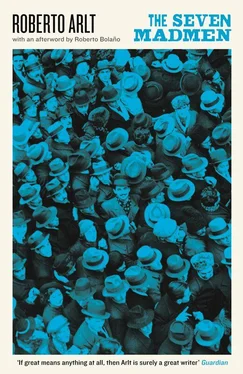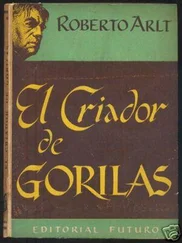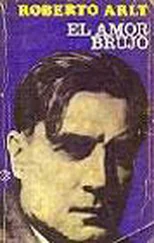“She’s gone?”
Erdosain frowned, cast a sideways glance down at the other man’s shoes, then knotted his brows, as if to judge Barsut’s discomfort through a screen, then slowly let fall:
“Yes … she’s … gone off … with … a … man …”
At that, he winked his left eye just as Ergueta the pharmacist was in the habit of doing. Beneath the bronze line of his brows, his pupils glittered fiercely. Erdosain added: “See? There’s the revolver. I could have killed them both, but I didn’t. What a strange animal man is, isn’t he?”
“And you allowed him to steal your woman from under your nose?”
All Erdosain’s pent-up hatred, added to the humiliation he had just received, were suddenly transformed into a kind of malicious glee. His mouth dry with bitterness, he retorted in a quavering voice:
“What’s that to you?”
A tremendous slap rocked him back on his chair. Later he was to recall that Barsut’s arm swung back and forth slapping him like dough. Erdosain covered his face in both hands as he desperately tried to escape from this crunching mass that bore down on him like an unleashed force of nature. His head thumped against the wall, and he fell to the floor.
When he came round, Barsut was kneeling beside him. He noted that his collar was loose and that streams of water were trickling down his neck. He could feel a stabbing pain from the bridge of his nose, and felt as if he was constantly about to sneeze. His gums were oozing blood, and under his puffy lips his teeth felt jagged on his tongue.
Erdosain struggled to his feet, then collapsed on to a chair; Barsut was so pale it seemed his eyes were like two jets of flame. Bands of muscles quivered beneath the skin of his cheeks. Erdosain felt as though he was being tossed in an endless nightmare, but he was aware of Barsut gripping him by the arm and saying:
“Look, you can spit in my face if you like, but let me speak. I have to tell you everything. Sit properly … that’s it” — Erdosain had straightened up without realising it — “Listen to me. I beg you. You’ve seen, haven’t you, that I could kill you with my bare hands … I went too far just now … I swear … if you like, I’ll beg for your forgiveness on bended knee. I can’t help it, that’s the way I am. Look … ah … ah … if people only knew.”
Erdosain spat blood. A red-hot stab of pain shot through his head. He doubled forward so far his forehead was resting on the table edge. Worried, Barsut asked him:
“D’you want to wash your face? It’ll do you good. Wait a second, don’t move.” At that, he rushed out into the kitchen, and came back with a basin full of water. “Here, rinse your face. You’ll feel better. D’you want me to rub you? I’m sorry, it was instinctive. But why did you wink like that as though you were making fun of me? Wash your face, please.”
Without a word, Erdosain plunged his face several times into the basin. Each time, he kept his head down until he ran out of air. Then he sat back and could feel the water evaporating from his wet hair. How tired he was! If only Elsa could see him now! How sorry she would feel for him! He shut his eyes tight. Barsut drew his chair up next to him and insisted:
“I have to tell you everything. If I didn’t I’d feel like a coward. As you can see, I’m quite calm. If you don’t believe me, you can feel my pulse. I’m being frank with you. Well, I … it was me who … it was me who gave you away to the Sugar Company … I sent the anonymous letter.”
Erdosain did not even lift his head. Barsut or someone else: what was the difference?
Barsut stared at him, waiting for him to speak. Then he said:
“Why don’t you say anything? Yes, it was me who betrayed you. D’you understand? I betrayed you. I wanted you to be arrested, so that Elsa would be left with me, so that I could humiliate her. You can’t imagine how many nights I’ve dreamt of them arresting you! You had no way of repaying the money, so they were bound to hand you over to the police. Why don’t you say anything?”
Erdosain raised his eyes. Barsut was there, it was definitely him, and he was saying all these things. Under the skin of his cheek, the muscles were trembling imperceptibly.
Barsut looked down, planted his elbows on his knees as if he were by a fireside, and then went on with slow insistence:
“I have to tell you everything. Who else could I tell all these things that are tearing me apart? They say, and it’s true, that the heart doesn’t really feel pain, but believe me, there are times when I ask myself: what am I living for? What’s the point of living if this is the way I am? D’you understand? You can’t imagine how often I’ve gone over and over these things in my mind. I shouldn’t even be telling you this. How is it that you can betray someone, then seek that same person out to tell your darkest secrets to, without feeling the slightest remorse? Time and again I’ve asked myself: why don’t you feel any remorse? What kind of life is this if we can be so cruel and not feel a thing? Can you tell me? According to what they taught us at school, sooner or later a crime eventually drives the criminal mad; so how can it be that you commit a crime and are not affected in the slightest?”
Erdosain was staring so hard at Barsut, it seemed his image was imprinted on his consciousness. His life forces wove the pale outline from such a finely meshed net that the impression it captured at that moment would stay with him for ever.
“Look,” Barsut continued, “I knew you hated me, and that you would have killed me if you could — and that made me feel happy and sad at the same time. How many nights I’ve gone to bed scheming about the best way to kidnap you! I even thought of sending you a bomb in the mail, or a snake in a cardboard box. Or of paying a driver to run you down in the street. I would shut my eyes and hours would go by while I thought of you two. I suppose you think I was in love with her?” Erdosain later observed that during their conversation that night, Barsut constantly avoided mentioning Elsa by name. “No, I’ve never been in love with her. But I would have loved to humiliate her. Humiliate her just for the sake of it: to see you down and out so that she would be forced to go on her knees and beg me for help. D’you understand? I’ve never loved her. That was why I gave you away like that: to humiliate her, because she was always so high and mighty with me. When you told me you had been swindling the Sugar Company, I felt a raging kind of satisfaction deep inside me. And even before you had finished speaking, I was saying to myself: Now we’ll see just how proud she can be.”
Erdosain could not prevent himself asking:
“But did you love her?”
“No, I’ve never loved her. If you only knew all she has made me suffer! Love her, when she never so much as gave me her hand? Every time she looked at me, it was as if she were spitting in my face. You may have been her husband, but you never really knew her! What d’you know about the kind of woman she is? She could watch you die and not move a muscle in sympathy. D’you understand? I remember when the Astraldi place went bust and you were out on the street: if she had so much as asked me for everything I had, I would have gladly given it her. Would have given her my whole fortune just to hear her say ‘thank you’. That and nothing more. I would have left myself penniless just to hear those words. Then one day when I tried to talk about it, all she said was: ‘Remo is man enough to earn for both of us.’ Ah, you’ve no idea what she’s like! She’d be capable of watching you die without moving a muscle. And then I’d start thinking — my God, how many things pass through a man’s mind! I would fling myself down on my bed and start to imagine such crazy things … you had murdered someone … you had to be saved, so she came to beg for my help, and without saying a word of all my sacrifices, I would move heaven and earth for you. What a woman, Remo! I remember when she used to do her sewing. I would have gladly sat beside her just to hold her basket — and I knew she wasn’t happy with you. I could see it in her face, in her tiredness, in her smile.”
Читать дальше











